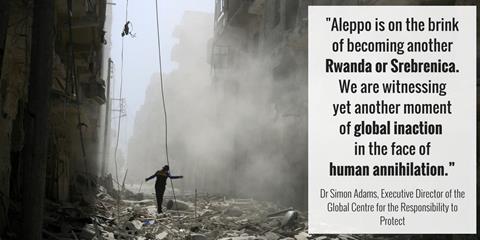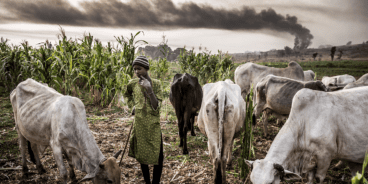
Atrocity Alert No. 34: South Sudan and Syria
Atrocity Alert is a weekly publication by the Global Centre for the Responsibility to Protect highlighting and updating situations where populations are at risk of, or are enduring, mass atrocity crimes.
South Sudan
On 28 November the Spokesperson for the UN Secretary-General announced that the UN Mission in South Sudan (UNMISS) had received reports of government-aligned militias deploying to the Equatoria region ahead of a planned offensive against armed rebels and ethnic groups presumed to be supporting them. Following a ten-day visit to South Sudan, the UN Commission on Human Rights in South Sudan stated on 1 December that there is already a “steady process of ethnic cleansing underway in several areas of South Sudan using starvation, gang rape and the burning of villages” and warned against increased levels of hate speech.
It is essential that the UN Security Council and African Union take expeditious action to stop any further deterioration of the situation in South Sudan before it is too late. Although UNMISS lacks the capacity to provide adequate protection to civilians from mass atrocity crimes, the UN Security Council-authorized Regional Protection Force has still not been deployed. Despite the imminent risk of mass atrocities, the UN Security Council continues to deliberate over a draft resolution that would impose an arms embargo on the country. Government officials and other leaders guilty of hate speech and ethnic incitement should also be sanctioned.
Syria
On 5 December the UN Security Council voted on a draft resolution proposing a seven day ceasefire for Aleppo, Syria, in order enable humanitarian access to more than 250,000 besieged, displaced and starving civilians in the city. Despite international horror regarding the dire situation in Aleppo, the resolution was not adopted due to a double-veto by Russia and China. This is the fifth time Russia and China have used their veto to obstruct international efforts to alleviate the suffering of Syrian civilians and hold perpetrators of war crimes and crimes against humanity accountable.
Since the renewed offensive began on 15 November, Syrian government forces have reportedly gained control of more than three quarters of opposition-held areas in Eastern Aleppo. According to the UN Office for the Coordination of Humanitarian Affairs, opposition fighters are reportedly preventing residents of Eastern Aleppo from fleeing while government forces also continue to attack densely populated areas.

In a statement released prior to the UN Security Council vote, the UN Special Advisers to the Secretary-General on the Prevention of Genocide and the Responsibility to Protect declared, “we cannot afford to wait any longer if we do not want to be the witnesses of what could be one of the biggest mass killings of civilians in our time.”
In light of the repeated and abject failure of the UNSC to uphold its responsibilities in Syria, the UN General Assembly should immediately take up the issue.


Atrocity Alert No. 444: Nigeria, Haiti and South Sudan
